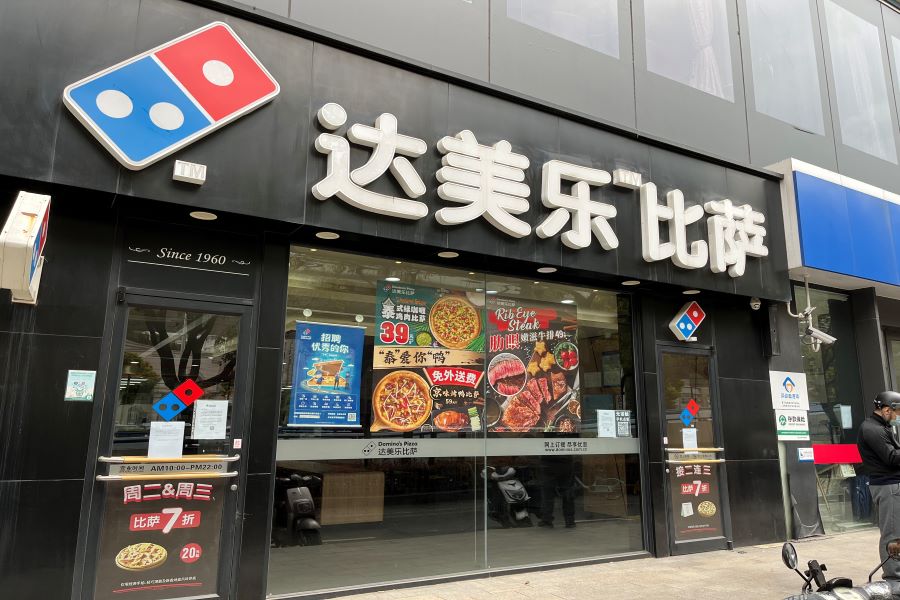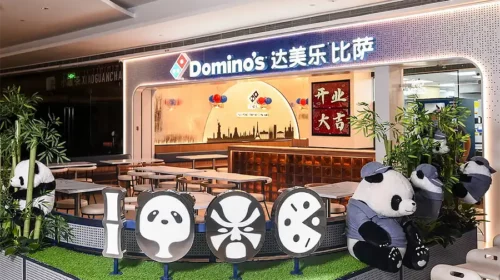Domino’s China Operator DPC Dash Delivers Hong Kong IPO

Chinese franchisee for world’s biggest pizza chain is growing rapidly in the underserved China market, with revenue up 46% last year
Key takeaways:
- Domino’s China operator DPC Dash has filed for a Hong Kong IPO that could raise up to $100 million and value the company at around $500 million
- Company has cashed in on China’s recent shift to takeout dining, posting 18.7% same-store sales growth last year
By Doug Young
The local operator of the Domino’s (DPZ.US) pizza chain is baking up China’s latest IPO, showing that locally popular hotpots aren’t the only ones who can tap global capital markets these days for some pepperoni from investors.
DPC Dash Ltd. disclosed the plan in its listing prospectus filed in Hong Kong this week, in a relatively modest deal likely to raise up to $100 million. Before we go any further, a major disclosure is needed that this particular writer is a regular diner at Domino’s in Shanghai. But that obvious bias aside, the company really does look like an interesting growth story, playing on China’s recent Covid-fueled craze for takeout dining that is Domino’s specialty.
This particular listing is the latest in a recent flurry of similar IPO plans by Chinese restaurant chains looking to raise money in Hong Kong. We’ve written about many of those, including the likes of Yang Guofu, Green Tea Group and QiXinTian. But among the group, which includes a heavy focus on locally popular hotpots, DPC Dash is distinguished as the lone foreign flavor.
The company is the master China franchisee for U.S.-based Domino’s. That’s quite similar to the arrangement for Pizza Hut, China’s pizza market leader that is part of Yum China (9987.HK), which is the China franchisee for U.S. fast food giant Yum Brands Inc. (YUM.US). Talk is obviously cheap, but DPC Dash is quite direct about its big future plans to challenge Pizza Hut.
“In the long term, our goal is to become the number-one pizza company in China, as other Domino’s Pizza’s franchisees have done in Asia, Europe and North America,” it says in the prospectus.
We’ll look shortly at the company’s financials, including its recent rapid growth and rapidly improving same-store sales that both look quite strong. The same-store sales growth looks especially impressive when one considers that most big fast-food operators have recorded anemic growth or even contraction for that metric lately due to pandemic-related disruptions.
Even as we write this article, the mega-city of Shanghai is preparing to go into what’s likely to become a complete lockdown starting on April 1, as it tries to tame the latest local Covid outbreak caused by the highly contagious Omicron variant. That will deal a major blow to DPC Dash, which counts Shanghai as its largest market with 143 of its 468 stores nationwide at the end of 2021.
But Covid aside, the market opportunity for pizza in China is quite large, according to third-party data in the prospectus. That data estimates China’s pizza market was worth 30.5 billion yuan ($4.8 billion) last year, and is expected to double to 62.3 billion yuan in 2025. The prospectus points out the market is relatively underserved compared to other Asian peers, with around 10 pizza stores per million people in China versus about 29 in Japan and South Korea, and a whopping 237 in the U.S.
Potential in smaller markets
For DPC Dash, one of the biggest opportunities is China’s smaller cities where the company has yet to make a major push – unlike Yum China that is already well represented in such areas. DPC Dash points to third-party data showing it is currently China’s number-three pizza chain with 3.6% of the market, compared with Pizza Hut’s dominant 39%. But DPC Dash is actually much closer to Pizza Hut in China’s top-tier cities, with 11.3% of the market compared with Pizza Hut’s 17.1% in those markets.
The company is relatively well-positioned to enter smaller markets where it currently lacks much presence due to its heavy focus on takeout delivery, which was already popular in China, but has become even more so during the pandemic. Such a delivery focus also helps it keep down costs, since its stores have only very basic in-store dining with smaller floor space and counter-only service.
That focus allowed the company to post same-store sales growth of 18.7% last year, a sharp rise from the 9% growth figure for 2020 and 7.3% for 2019. Reflecting the big potential of smaller cities, the company’s same-store sales in markets outside Beijing and Shanghai grew 37.7% last year. By comparison, same-store sales for Beijing and Shanghai – which collectively accounted for more than half of its store count at the end of last year – combined, grew “just” 14.2% for the year.
That rapid growth allowed the company to improve its store-level operating margins to 9.2% last year from 4% in 2020.
At the highest level, the company’s revenue grew 46% last year to 1.6 billion yuan, as its store count grew 29% during the year. It plans to open 300 stores in 2022 and 2023, which would boost its total store count to 768 by the end of next year if it reaches that goal. By comparison, Pizza Hut had over 2,500 stores in China by the end of last year.
DPC Dash is still operating squarely in the red, with a net loss that widened to 471 million yuan last year from 274 million yuan in 2020. Its adjusted net loss, which typically excludes non-cash items like stock-based employee incentives, actually narrowed to 143 million yuan last year from 200 million yuan in 2020.
As we’ve said already, one of DPC Dash’s edges over other chains is its roots as a takeout dining specialist. It noted in the prospectus that takeout orders accounted for 51.5% of China’s overall pizza market last year, but the figure is expected to grow to about 60% of sales by 2025.
We’ll close with a look at how the company might be valued using Yum China as our yardstick, though we should point out Yum China derives the lion’s share of its money from its local KFC operation that is much bigger than Pizza Hut. Yum China, which is profitable and recently reported 19% revenue growth for 2021, currently trades at a price-to-sales (P/S) ratio of 1.9. A similar valuation for DPC Dash, which seems relatively feasible, would give the company a valuation of nearly $500 million.
To subscribe to Bamboo Works free weekly newsletter, click here






